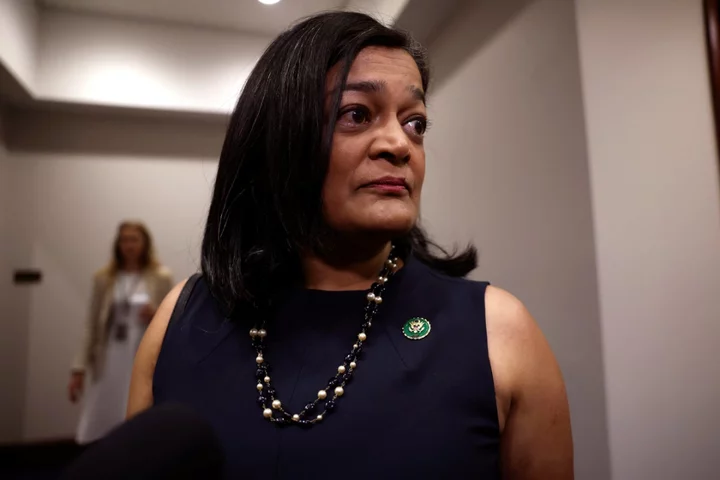
Chelsea confirm signing of Nicolas Jackson from Villarreal
Chelsea have announced the signing of striker Nicolas Jackson from Villarreal. The Senegal striker has penned a long-term contract at Stamford Bridge.
2023-07-01 02:21

Angry onlookers shout ‘dog killer’ at George Santos as he arrives at court for fraud hearing in New York
Angry protesters called congressman George Santos a “dog killer” on Friday as the Republican made an appearance at a Long Island federal court house, his first hearing since pleading not guilty last month to a13-count indictment related to fraud and money laundering charges. The chants were in reference to an alleged scandal in which the representative allegedly made off with more than $3,000 raised in a fundraiser to save a disabled US Navy veteran’s service dog, one of the many alleged acts of deception Mr Santos made as he worked towards his spot in Congress. The first-term congressman has denied knowing about veteran Richard Osthoff or his dog, calling the allegations “fake.” As Mr Santos exited court, Mr Osthoff, who was in the crowd, yelled, “You killed Sapphire, George. You killed my dog.” Others in the crowd reportedly chanted, “Resign” and “Shame” as the Republican passed by. Mr Santos was in court for a status conference on the federal case against him, where he faces 13 different charges, including fraud, money laundering, and theft of public funds. Prosecutors charge the New York rep mislead supporters and donors into giving him money, which he allegedly used for personal expenses that funded a lavish lifestyle. They also claim he misleadingly obtained unemployment benefits and lied about his personal finances when campaigning for the House of Representatives. Mr Santos has admitted to lying about certain aspects of his background, and is accused of fabricating everything from his education background to his religion to his career success. In court, Mr Santos did not speak, but his lawyers claim he and the government have exhibited a “wonderful working relationship” so far. The defence also said the prosecution has given them 86,000 pages of evidence to go through. The next court date for Mr Santos is 7 September. Outside of the federal case against him, Rep Santos is also under investigation by the House Ethics Committee. Read More Santos reveals names of two $500,000 bond cosigners ahead of court-ordered release Aide fired by George Santos says he got his job after sending money to Republican's deputy Effort to expel Santos falters as Republicans vote to send measure to Ethics Committee Watch: George Santos returns to court after fraud and money laundering charges AP News Digest 3:05 a.m. Rep. George Santos set to appear federal court on fraud and money laundering charges
2023-07-01 02:20

Senator who once worked at a Planned Parenthood warns that Republicans are planning a national abortion ban
When a draft of the Supreme Court’s Dobbs v Jackson opinion that would overturn Roe v Wade leaked in May of last year, US Senator Tina Smith had only three words. “This is bulls***,” the Minnesota Democrat tweeted. She had similar words when Walgreens announced in March of this year it would not dispense abortion pills in states where abortion remained legal. Ms Smith told The Independent in a phone interview that she knew the consequences of overturning the enshrined constitutional right to seek an abortion from her time working at Planned Parenthood as the Minnesota branch’s executive vice president for external affairs. She said her time working there taught her about the effects restrictions have on women’s lives. “The first thing I realized is that for women facing a decision about what to do about an unplanned pregnancy, a pregnancy that they don't want, this is a purely personal decision for them,” she said. “As a policymaker, why do Republicans in the Senate and in state legislators around the country think that they know better than those women whose stories they'll never know? Why do they think that they should be the ones who decide? It’s those women's decisions.” Ms Smith said that the Dobbs decision has led to rooting the question of abortion rights in terms of personal freedom. “You know, they can see this, these stories of individuals and doctors that are trying to provide the best health care, get the best health care for people, and you know, they unable to do that and they can see that that's just wrong,” she said. Sen Smith arrived under peculiar circumstances after then-Governor Mark Dayton nominated her, while she was serving as lieutenant governor of Minnesota, to replace Sen Al Franken amid multiple allegations of inappropriate sexual behaviour. Similarly, she has often been overshadowed by Minnesota’s senior Democratic Sen Amy Klobuchar, who ran for president. She and fellow midwestern Democratic Sen Tammy Baldwin, of Wisconsin, have a running joke that reporters and Capitol Hill staff often confuse them. In the past year, Sen Smith has emerged as a stronger presence. She wrote some of the climate provisions in what would become the Inflation Reduction Act. When Sen John Fetterman (D-PA) left the Senate for a few weeks to undergo treatment for depression, she spoke about her own difficulties with the condition. In addition, she’s emerged as one of the strongest voices defending abortion rights. Ms Smith said the Dobbs decision has made the contrast between Democrats and Republicans clearer. In recent months, Sen Tommy Tuberville (R-AL) has blocked military nominations because of the Pentagon’s policy that reimburses people who travel out of state to receive abortions. “What Senator Tuberville is doing is so outside the norms of what we should be doing in the Senate, it's outrageous,” she said. “I just need to point out that what Senator Tuberville is trying to do is to overturn a policy which basically provides women serving in the military with the same access to health care that people that are incarcerated in our federal prisons have.” Few Republicans seem deterred from their opposition to abortion despite the role it played in dulling their efforts to flip the Senate last year. Ms Smith’s colleague Sen Tim Scott (R-SC), now a candidate for president, told the Faith & Freedom Coalition’s Road to Majority Conference last month “thank God almighty for the Dobbs decision.” Former vice president Mike Pence has called for a 15-week national abortion ban. Meanwhile, former president Donald Trump has campaigned as the president who nominated the three Supreme Court justices who made the decision possible. Florida Gov Ron DeSantis, who often places a second distant behind Mr Trump in polls, signed legislation banning abortion after six weeks. As vice chairwoman of the Democratic Senatorial Campaign Committee, Ms Smith faces a tough challenge because not only does she have to defend Senate seats in Wisconsin, Michigan, Pennsylvania, Arizona and Nevada – all of which President Joe Biden won in 2020 – she also has to defend Senate seats in three states Mr Trump won twice: Ohio, Montana and West Virginia. “And make no mistake, if Republicans win the Senate or if Republicans win the White House, we can see from their statements, they're going to move to pass a national ban on abortion,” she said, noting how many GOP candidates for Senate oppose abortion. “So, this is the contrast, this is what voters will be confronted with when they cast their votes in 2024,” she said. “Do you want to elect individuals who think they know better, that they should be the ones making decisions, individuals that want to ban abortion rights? Or do you want to elect Democrats who believe that women and not politicians should be making their own health care decisions?” At the same time, Democrats face huge challenges to codify abortion rights. Last week, Mr Biden told donors he was personally uncomfortable with abortion. “I'm a practising Catholic,” he said on Tuesday. “I'm not big on abortion, but guess what? Roe v Wade got it right.” Sen Smith defended Mr Biden’s actions defending abortion rights. “I believe that the President and the administration have moved decisively in all the ways that they can as they look for other ways to the practical reproductive freedom, that's a good thing,” she said. “I'm proud of the work that they've done. I think ultimately, the action that we need to take is legislative action, and that is why we need to win these elections.” Last year, shortly after the Dobbs leak, Senate Majority Leader Chuck Schumer tried to put the Women’s Health Protection Act, which would have codified the protections in Roe, to a vote. But Sen Joe Manchin (D-WV) opposed the measure. Even then, Sen Kyrsten Sinema of Arizona, who later left the Democratic Party to become an independent, opposes removing the filibuster, which demands a two-thirds majority to pass legislation. Sen Smith said if Democrats with the House, the Senate and the White House again, they should get rid of the filibuster. “And you know, we need to work towards a Senate majority that will not only support reproductive freedom but will also change Senate rules so that we can act on that belief,” she said. “And that I think is going to as I said before, that I believe will be a decisive issue in the in the elections in 2024.” Read More Congresswoman who authored abortion rights bill calls Senate’s inaction to codify Roe v Wade ‘such a crime’ Ritchie Torres, the only openly gay Black man in Congress, on how he fights GOP ‘bullying’ of LGBT+ people Republicans try to thread the needle on abortion on anniversary of the death of Roe 'Rage giving' prompted by the end of Roe has dropped off, abortion access groups say Arizona executive order safeguards abortion seekers and providers from prosecution Why some doctors stay in US states with restrictive abortion laws and others leave
2023-07-01 01:55

Biden Will Detail New Steps on Debt Relief After Supreme Court Ruling
President Joe Biden assailed a Supreme Court ruling throwing out his plan to forgive billions of dollars in
2023-07-01 01:53

US Consumers Lose Steam, Setting Economy Up for Sharp Slowdown
US consumer spending — the economy’s main engine — has lost steam for most of this year, portending
2023-07-01 01:51

Biden says it would be ‘a mistake’ to expand Supreme Court – despite ruling on affirmative action
President Joe Biden has said it would be a mistake to expand the Supreme Court, despite its recent rulings against affirmative action in higher education, LGBT+ rights, and student loan debt forgiveness. The high court overturned decades of policies when it ruled this week that race-based admissions were not constitutional, preventing universities from considering race as a factor in student applications. Mr Biden hit out at the ruling on Thursday, commenting: “We cannot let this decision be the last word. “Discrimination still exists in America,” he added. “This is not a normal court.” Despite his strong reaction to the decision, the president ruled out the idea of “packing” the Supreme Court with additional justices in order to change the balance of opinion on the bench. “I think if we start the process of trying to expand the court, we’re going to politicise it maybe forever in a way that is not healthy,” Mr Biden told MSNBC’s Nicolle Wallace. It was a question Mr Biden was asked regularly during his last presidential campaign when a worried Democratic electorate expressed concern that there were few liberal justices left on the bench which would allow for the decisions handed down over the past year. Although it would not be unprecedented to change the number of justices in the Supreme Court — as the Constitution does not specify how many justices there should be — the number has remained at nine since not been changed since 1868. The court currently consists of nine justices — three of whom were chosen during Donald Trump’s only term as president, tipping the balance over to more conservative judges. Indeed, just three of the current nine justices were appointed by Democratic presidents — Justice Ketanji Brown Jackson was appointed by Mr Biden, and Elena Kagan and Sonia Sotomayor were appointed by President Barack Obama. Clarence Thomas was appointed by President George HW Bush, and President George W Bush appointed Samuel Alito and Chief Justice John Roberts. Since Mr Trump’s appointment of justices Neil Gorsuch, Brett Kavanaugh and Amy Coney Barrett, the court has weighed in with a conservative hand on landmark rulings — including the overturning of the historic abortion 1973 ruling Roe v. Wade, giving the decision on abortion provision over to individual states. In addition to the ruling on affirmative action, on Friday 30 June, the court also struck down President Biden’s plan to cancel student loan debts for millions of Americans, reversing his campaign-trail promise as borrowers prepare to resume payments this summer. The court also ruled that a wedding website designer may refuse to create work for people in the LGBT+ community if it conflicts with their religious beliefs. The case was unique in that it asked justices to rule on a question that was solely based on a hypothetical scenario. Read More Supreme Court allows Colorado designer to deny LGBT+ customers in ruling on last day of Pride Month Supreme Court strikes down Biden’s plan to cancel student loan debts The Supreme Court will decide if some judges have gone too far in striking down gun restrictions How the Supreme Court student loan decision affects you
2023-07-01 01:47

Mason Mount will take his Man United medical on Monday
Mason Mount will take his Man United medical on Monday
2023-07-01 01:46

New York official was bribed and let chicken contaminated with metal be served in school lunches, jury finds
A top official overseeing school lunches in New York City’s sprawling public school system took bribes and allowed dangerous chicken products contaminated with shards of metal and plastic to be served to children, a jury concluded on Wednesday. Eric Goldstein, who oversaw the city’s Office of Food and Nutrition Services, was convicted in a Brooklyn court of conspiracy, extortion, wire fraud, and taking bribes. Prosecutors said he was bribed with cash and an ownership stake in a food company by the owners of food supply company Somma – Blaine Iler, Michael Turley, Brian Twomey – in exchange for his cooperation facilitating lucrative contracts with the city. The trio of men were convicted of conspiracy, wire fraud, and bribery. “Eric Goldstein was for sale,” prosecutor Laura Zuckerwise said in her closing statemnets. “And Michael Turley, Blaine Iler and Brian Twomey, they bought him.” Goldstein could face up to 20 years in prison, according to The New York Post. The former school official, who previously started a food company of his own alongside Turley, Iler, and Twomey called Range Meats Supply, helped fast-track Somma to get contracts supply nearly 2,000 schools in 2015, leading to a huge spike in demand and millions of dollars of food orders. “I’m going to buy a lot of f***ing chicken from you guys, let’s do the beef,” Goldstein allegedly told Iler at a 2015 meeting, according to prosecutors. By September of 2016, people were complaining that Somma chicken contained pieces of wire-like metal and plastic, according to school incident logs shown to jurors. The chicken caused people to bleed and in one case choke on a bone in a supposedly boneless dish, according to officials. As complaints mounted, Turley, Iler, and Twomey allegedly offered Goldstein ownership of Range Meats and $66,000. The trio also sent money to Goldstein’s divorce lawyer and took the school official on trips around the world. The group used the code name “Roger Rabbit” to refer to Goldstein, according to law enforcement. During the trial, prosecutors showed jurors emails between the now-convicted conspirators, and showed photos of one of the tainted drumsticks, which had a bright red liquid oozing out of it. A lawyer for Goldstein told The New York Times has was “extremely disappointed” and would appeal the verdict.
2023-07-01 01:25

Serbia media guide
An overview of the media in Serbia, including links to broadcasters and newspapers.
2023-07-01 00:45

Boost for Wagner as Mali shuns UN troops, but at what cost?
As it pushes out 12,000 UN peacekeepers, Mali will be relying ever more heavily on Russian mercenaries.
2023-07-01 00:21

‘It’s hard on our family’: For these lawmakers with trans children, Republican attacks are personal
In 2019, for the first time, Pramila Jayapal shared with members of Congress the joy of her then-22-year-old child’s “newfound freedom” embracing their gender identity. “My child is finally free to be who they are,” she wrote after a hearing. “With that freedom comes a responsibility, for us as legislators, to legislate with love and not fear.” Four years later, when her House colleagues introduced legislation to ban transgender women and girls from sports consistent with their gender, the congresswoman – the “proud mom of a trans kid” – shared the pain she felt against a wave of similar bills and the hateful rhetoric fuelling them. “I know that when my daughter came out it was not an easy process,” she said. “What she continues to see around her, and from politicians, unfortunately, is a condemning of who she is. We cannot allow that to happen.” Ms Jayapal is among parents in Congress and in state legislatures across the country combatting legislation to define the sports their children can play as themselves; the bathrooms, names or pronouns they can use; and what medically recommended and potentially life-saving medical care they can receive. “It’s really hard. It’s hard on our family, it’s hard on my daughter to see this – I think she has the comfort of community around her, that supports her, including her very fierce mother,” Ms Jayapal tells The Independent. “I have people, parents, and kids who come up to me … who just ask if they can hug me and start crying,” she says. “Grown men, women and kids and people who just are really fearing for their safety and for their future.” One of the most prominent voices against sweeping legislation targeting LGBT+ people in Kentucky is Karen Berg, a state senator whose transgender son Henry died by suicide in late December. In Nebraska, where the state’s unicameral legislature is the smallest in the country, with a small body of lawmakers who know one another intimately, state Senator Megan Hunt joined an epic filibuster to combat anti-trans legislation that would impact her 13-year-old trans son. US Rep Katherine Clark, the Democratic Whip in the House of Representatives, has endured ongoing right-wing media scrutiny and social media harassment involving her trans daughter Riley. Now-former US Rep Marie Newman, whose daughter is trans, mounted a trans pride flag outside her office after far-right congresswoman Marjorie Taylor Greene unleashed a vitriolic string of transphobic statements. Parents first, these lawmakers and others have centred the experience of their children and the lives of other trans and nonbinary Americans in their testimony and advocacy, reclaiming the so-called “parents’ rights” movement that has sought to remove trans stories from public life altogether. “I’m not gonna lie – I get really hot under the collar,” Ms Jayapal says. “And I try to control myself. But it is personal. And it is also collective. It’s both. And I see over and over again, that people across the country are just disgusted and shocked and saddened by what this Republican Party has resorted to.” LGBT+ Americans want to live “their full, authentic selves, and they want to be able to access all the same services that everyone wants,” she says. “I’m never gonna stop fighting for them. And they can count on me to be there and to stand up for them and to push back and push forward.” A new wave of vitriol and ‘baffling’ legislation In 2016, the day after Donald Trump’s presidential victory, Marie Newman decided to run for Congress. Her daughter, Evie, began transitioning two years earlier. Her fears of a coming tide of legislation targeting LGBT+ Americans, emboldened by the incoming administration, compelled her mother to run for office. “The day after Trump was elected my daughter came downstairs and said, ‘Mom, am I going to be safe?’” Ms Newman tells The Independent from her office in Chicago. In the years after Trump’s election and Ms Newman’s two years in Congress, lawmakers across the country introduced a record number of bills targeting LGBT+ Americans as Republican officials weaponise anti-trans attacks for 2024 campaigns. “It’s baffling to me,” Ms Newman says. “They’re effectively creating a problem where there is nothing. They’ve created this weird and creepy solution for a zero problem.” By the end of May, state lawmakers had introduced more than 500 bills impacting LGBT+ people in 2023, including 220 bills specifically targeting trans and nonbinary Americans, according to an analysis from the Human Rights Campaign. Republican members of Congress have also introduced federal legislation that mirrors some of the proposals dominating state capitols. One measure would impose national restrictions on trans athletes, and another bill would impose a similar but more-expansive version of what critics have called state-level “Don’t Say Gay” bills used to restrict classroom discussion of LGBT+ people and events. Opponents of so-called “Don’t Say Gay” laws have sparked fears that their broad scopes could effectively block discussion of LGBT+ people, history and events from state schools, and be weaponised against students, staff and their families under threat from potential lawsuits against school districts over perceived violations. A federal version backed by more than 30 House Republicans would ban institutions that receive federal funds from hosting “sexually oriented” discussion, materials and events where children could be present. Democratic members of Congress, meanwhile, have repeatedly introduced the Equality Act, which would amend the landmark Civil Rights Act of 1964 to add federal protections from discrimination on the basis of sexual orientation and gender identity. The measure, which has the support of President Joe Biden, has been introduced five times in both chambers of Congress since 2015. In her remarks to the House in 2021 in support of the legislation, Ms Newman said she recognised that from the moment her daughter came out as trans, she “would be living in a nation, where in most of its states, she would be discriminated against merely because [of] who she is.” “And yet it was the happiest day of my life, and my daughter has found her authentic self,” she said. Far-right US Rep Marjorie Taylor Greene of Georgia, among the most noxious voices against LGBT+ rights in Congress, has called the Equality Act “disgusting,” “immoral” and “evil”. Following Ms Newman’s testimony, she intentionally misgendered the lawmaker’s daughter. Ms Newman, whose office was located directly across the hall from Ms Greene’s, responded by hoisting a trans pride flag outside her door. Ms Greene replied with a poster outside her office reading: “There are TWO genders: Male & Female. Trust The Science!” Ms Newman says she couldn’t care less what kinds of posters Ms Greene hangs outside her office, but “what we can’t have is lawmakers going after one another’s families – that is not acceptable.” “The vitriol is unabashed now. We see lawmakers going after one another in the hallways in their offices, and they’re on the floor, everywhere and then creating rallies – hate rallies,” Ms Newman tells The Independent. “I’m worried about democracy, and I’m worried about our level of ability to live with one another. It’s alarming.” ‘Their platform is hate’ Nebraska has a population of fewer than 2 million people. It is also the smallest legislature in the country, with only 49 members. All of state senator Megan Hunt’s colleagues have met her child. Many of them have babysat for Ms Hunt or travelled with her family for legislative work. “Many of you have helped me take care of him,” she told lawmakers earlier this year as they considered legislation to outlaw gender-affirming healthcare for trans youth. “And this bill, colleagues, is such an affront to me, personally, and would violate my rights to parent my child in Nebraska. And I just want to tell you that. I want to stop letting that go unsaid, actually,” she said. Her viral remarks dropped the facade of performative “civility” in legislative debates across the country, underscoring the attacks against her own family coming from members of a small body of lawmakers that she has known for years. Much of that legislation has been drawn from a handful of conservative Christian special interest groups and right-wing lobbyists, working in tandem with state lawmakers to introduce nearly identical bills across the US. The debates surrounding trans care are “totally cooked up to divide us, to put divisions in our country, and they don’t even reflect what most people care about,” Ms Hunt told The Independent earlier this year. “These groups have a long history of using religion to justify discrimination and marginalization,” she said. “It’s always about finding another scapegoat. And who could be a better scapegoat than children. They don’t have a lobby, they don’t have a lot of money, they are not fighting for themselves as much as other groups are. And for me, it’s just too far. … I didn’t run for office to do this bull****.” Ms Hunt was the subject of a complaint to Nebraska’s Accountability and Disclosure Commission filed by a right-wing activist lawyer, who alleged that, because her son is trans, her opposition to legislation potentially impacting his healthcare is a conflict of interest. The complaint was condemned by lawmakers from both parties. “They can punish me any way they want to. But when we’re talking about human rights, we’re talking about trans rights. That’s not a partisan issue. It’s not a political issue. It’s about standing up in the face of blatant discrimination against an entire group of people,” she told The Independent. “And there’s only one right answer, which is to not legislate hate against other people.” Kentucky state Senator Karen Berg did not intend to run on a platform around LGBT+ rights, nor did she predict a fever in state capitols to dismantle them. “I never thought, ‘Oh, my God, we’re gonna take two steps forward, and then 100 years back’,” she tells The Independent from her home in Kentucky. “I did not see it.” Henry Berg-Brousseau – her 24-year-old son and a press secretary for the Human Rights Campaign, the nation’s largest LGBT+ civil rights organisation – did. “He had known and he was telling me this was coming for a year and a half or more, maybe. He was dreading the state session,” she tells The Independent. Henry died by suicide on 16 December. After her son’s death, Ms Berg prepared for the eight-week legislative session ahead of her, as Republican lawmakers in the state prepared what opponents have labeled as one of the most far-reaching anti-trans laws in the nation. On 28 June, a federal judge struck down parts of the law that ban affirming healthcare, among a string of recent federal court decisions that have tossed out or temporarily blocked gender-affirming care bans in several states. Ms Berg sees the fight for LGBT+ rights in state legislatures as part of a broader anti-democratic threat from a Republican Party that is “trying to divide us because they think it is the only way to win at this point”. “Their agenda and their policy and their platform is hate,” Ms Newman says. That agenda thrives, in part, within a feedback loop of well-funded special interest groups and political action committees relying on candidates’ anti-trans rhetoric, she says. ‘A focal point for hope’ In remarks on the House floor to recognise Trans Day of Visibility on 31 March, US Rep Katherine Clark of Massachusetts stood to honour “trans joy that deserves to be celebrated – not eradicated,” sharing her “unconditional love” for her trans daughter. “I rise in solidarity with every trans American seeking nothing less than their inalienable right to the pursuit of happiness,” she added. “To stand in the way of that right is to stand against our most basic American values, but that’s exactly what MAGA extremists are doing across this country,” said Ms Clarke, condemning the “especially vicious crusade on our kids.” In response to those attacks, Ms Jayapal has introduced a Trans Bill of Rights, an ambitious policy framework for federal protections for trans and nonbinary people. “We needed a positive vision,” she tells The Independent. “Obviously the Equality Act is a big part of that, but something that really centered trans people in particular.” The proposal, supported by dozens of civil rights organizations and drafted with input from trans rights groups, outlines a series of federal government protections against discrimination in all aspects of public life, including housing, education and healthcare. A Trans Bill of Rights is unlikely to advance in Congress, but it has served as an instructive organising tool among advocates and lawmakers to illustrate the chasm between current protections and unrealized demands. “Every time I talk about it, it becomes a focal point for hope,” Ms Jayapal says. “And for a sense of justice to continue to prevail, that we know what we’re striving for – even if we’re having to fight all this opposition and cruelty right now.” The flood of anti-trans bills and the political debates surrounding them have also negatively impacted the mental health of an overwhelming majority of young trans and nonbinary people, according to polling from The Trevor Project and Morning Consult. Two-thirds of young LGBT+ people reported that political debates surrounding their identities have made their mental health worse. Such stark disparities and the concurrent legal battles surrounding trans rights throughout Pride Month have underscored the need to recognise the “healing and the hurt” in those celebrations, Ms Jayapal says. Much of that can start at home, according to LGBT+ advocates. Fewer than 40 per cent of LGBT+ youth found their home to be affirming, according to The Trevor Project. Trans and nonbinary youth living in homes where their pronouns are respected reported lower rates of attempting suicide. Ms Jayapal often speaks with parents who ask her how she came to understand what her daughter experienced, helping to alleviate a tension among some families that are unsure how to correctly respond to their child’s identity. “You don’t have to know everything upfront, and you don’t have to be afraid of making a mistake with language or not being fully aware or educated on even what the process of transitioning looks like,” Ms Jayapal says. “You can learn all of that. The most important thing is that your child feels like you are there for them, that you’re willing to learn and that you’re supportive, that she or he is the same person they’ve always been.” If you are based in the US and seek LGBT+ affirming mental health support, resources are available from Trans Lifeline (877-565-8860) and the LGBT Hotline (888-843-4564), as well as The Trevor Project (866-488-7386, or text START to 678-678). If you are experiencing feelings of distress, or are struggling to cope, you can speak to the Samaritans, in confidence, on 116 123 (UK and ROI), email jo@samaritans.org, or visit the Samaritans website to find details of your nearest branch. If you are based in the US, and you or someone you know needs mental health assistance right now, call or text the 988 Suicide & Crisis Lifeline at 988. This is a free, confidential crisis hotline that is available to everyone 24 hours a day, seven days a week. If you are in another country, you can go to www.befrienders.org to find a helpline near you. Read More She lost her transgender son to suicide. She isn’t giving up fighting for him Pioneering transgender lawmaker has advice for pushing back against transphobic bills Ritchie Torres, the only openly gay Black man in Congress, on how he fights GOP ‘bullying’ of LGBT+ people
2023-06-30 23:59

Ferran Torres resisting transfer talks with Aston Villa
Barcelona winger Ferran Torres is not currently interested in a summer move to Aston Villa. Unai Emery is keen to add a winger to his ranks this summer.
2023-06-30 23:24
